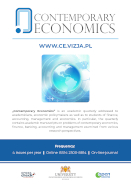Supporting Environmentally Conscious
Consumer Sales Law by Life-cycle Thinking
Supporting Environmentally Conscious
Consumer Sales Law by Life-cycle Thinking
Author(s): Katarzyna Klimkiewicz, Anna Dubel, Katarzyna Południak-GierzSubject(s): Energy and Environmental Studies, Public Law, Environmental and Energy policy, Law on Economics
Published by: Akademia Ekonomiczno-Humanistyczna w Warszawie
Keywords: circular economy; life cycle assessment; consumer sales law; legislation process; remedies for non-conformity;
Summary/Abstract: The circular economy is a core approach driving innovative economic solutions. Although the legal system should support the development of such an economy, scientific methods to assess the environmental impact of legal rules are lacking. Legislators and scholars have highlighted consumer law as an area requiring ecologi- cally efficient solutions. This research aims to design a method to calculate environmental costs related to the exercise of remedies for nonconforming goods under a consumer sales contract.Various environmental impact assessment approaches are reviewed to identify those which can be used when designing a method for calculating the environmental impact of legislative provisions. The Life Cycle Thinking is applied and the Life Cycle Assessment method is chosen and used to compare different remedy-scenarios, that is, when the consumer chooses repair, replacement, price reduction or termination. A formula is devised to determine which remedies should be prioritized and whether it is possible to design an eco-friendly hier- archy of remedies in consumer sales law. Though it proved impossible to design a rigid hierarchy of remedies, which would be optimal in every scenario from the perspective of environmental costs generated as a result of the consumer exercising the rights for non-conforming goods, the environmental costs of exercising each of the rights under the remedies available to the consumer can be assessed not only in concreto but also in abstracto allowing for formulation of specific recommendations for legislator.
Journal: Contemporary Economics
- Issue Year: 17/2023
- Issue No: 2
- Page Range: 174-196
- Page Count: 23
- Language: English

